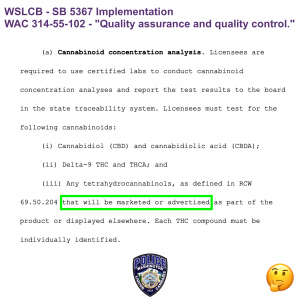The final pre-proposal focus group on the 2023 THC bill rulemaking was scheduled for Thursday, yet several addressable issues remained detectable after ten months of effort.
Here’s a look at cannabis-related policymaking events on the calendar in the week ahead.
Monday April 29th
At publication time, no cannabis-related policymaking events were scheduled.
Tuesday April 30th
WSLCB - Focus Group - SB 5367 Implementation
On Tuesday, the previously planned Washington State Liquor and Cannabis Board (WSLCB) focus group on the SB 5367 Implementation rulemaking project had been cancelled.
- [ Event Details, Rulemaking Project ]
- On Wednesday April 17th, WSLCB Director of Policy and External Affairs Justin Nordhorn announced a revised schedule for the pre-proposal rulemaking project workshops, lowering the total count of planned events from 15 to ten and moving the date of completion of those workshops to the beginning of May rather than mid-May. Staff still planned to accept written comments through May 15th.
- At the Tuesday April 23rd Board Caucus, Policy and Rules Manager Cassidy West stated that she would present a CR-102 containing proposed rules at the July 17th Board Meeting (West stated “July 18th,” a Thursday). By the next day at the Wednesday April 24th Board Meeting, she had revised the expected CR-102 date to June 19th (West stated “June 18th”, a Tuesday). During the Friday April 26th focus group, West reiterated her intent to present the CR-102 for board member approval to file “in June.”
WSLCB - Board Caucus
On Tuesday at 10am PT, the weekly WSLCB Board Caucus was scheduled to recur.
- [ Event Details ]
- At publication time and according to the agenda, members were only scheduled to provide updates to one another.
Wednesday May 1st
At publication time, no cannabis-related policymaking events were scheduled.
Thursday May 2nd
WSLCB - Focus Group - SB 5367 Implementation
On Thursday at 2pm PT, the final WSLCB focus group on the SB 5367 Implementation rulemaking project was scheduled to occur.
- [ Event Details, Rulemaking Project ]
- The workshop on Thursday was scheduled to focus on the overall rulemaking including multiple revised chapters.
- During the previous week, agency staff heard feedback on WAC 314-55-105 (“Packaging and labeling”) on Tuesday April 23rd then discussed draft changes to WAC 314-55-102 (“Quality Assurance and Quality Control Testing”) and WAC 314-55-109 (“Cannabinoid Additives”) on Friday April 26th.
- In both circumstances, the draft rules under discussion were published hours or minutes before the start of the events.
- At publication time, several addressable issues had been raised which would likely require further revision of the envisioned rules.
- Participants pointed out an elephant in the room regarding only requiring testing for tetrahydrocannabinol (THC) compounds licensees intend to market, articulating a simple workaround bad actors could utilize to spike more highly manufactured cannabis products with unadvertised cannabinoids after testing.
- At publication time, the WSLCB Cannabis Central Reporting System (CCRS) did not support reporting cannabinoids other than D9(A) or CBD(A). It’s Cannabis Observer’s understanding that WSLCB IT staff had been engaged as part of the rulemaking process, so it seems safe to presume they are anticipating making changes to support this work.
- Without an explicit list of (potential) compounds to report, CCRS cannot support the envisioned reporting requirements.
- As well, it was unclear to what extent software integrators had been notified to expect changes.
- Likewise, the testing labs needed to know what cannabinoids are of interest to WSLCB staff to offer testing services and evaluate liabilities. Vague rule language stating "any test that suggests the presence of a synthetic cannabinoid must be immediately reported to the WSLCB" exemplified the kind of legal ambiguity which some participants may be uncomfortable with.
- For example, if there remained 5-10% of undefined "slurry" or “minors” in extracts or distillates, could one attest that "suggests the presence of a synthetic cannabinoid"?
- If WSLCB Enforcement and Education staff intend to collect end product samples for testing by the Washington State Department of Agriculture (WSDA) Chemical and Hop Laboratory, the list of cannabinoids they expect lab staff to have adopted or developed standard methods to test for must be defined. It’s Cannabis Observer’s understanding that the WSDA lab is only contracted to conduct pesticide testing of collected samples, not tests for cannabinoid concentrations nor heavy metals.
- Should a licensee want to test for another THC compound other than D9, a “Total THC” value has to be reported on the COA which sums the THC and THC-A values, applying a "conversion factor" for the acids. But those conversion factors are not defined for anything except D9 THC and CBD.
- Participants also pointed out that a Total THC value combining D9, D8, THC-V, and possibly other compound values is misleading "misinformation" at best, and shouldn't be required. West demurred that the revised Total THC value was a requirement in statute, yet WSLCB staff recognized it was problematic.
Friday May 3rd
At publication time, no cannabis-related policymaking events were scheduled.
